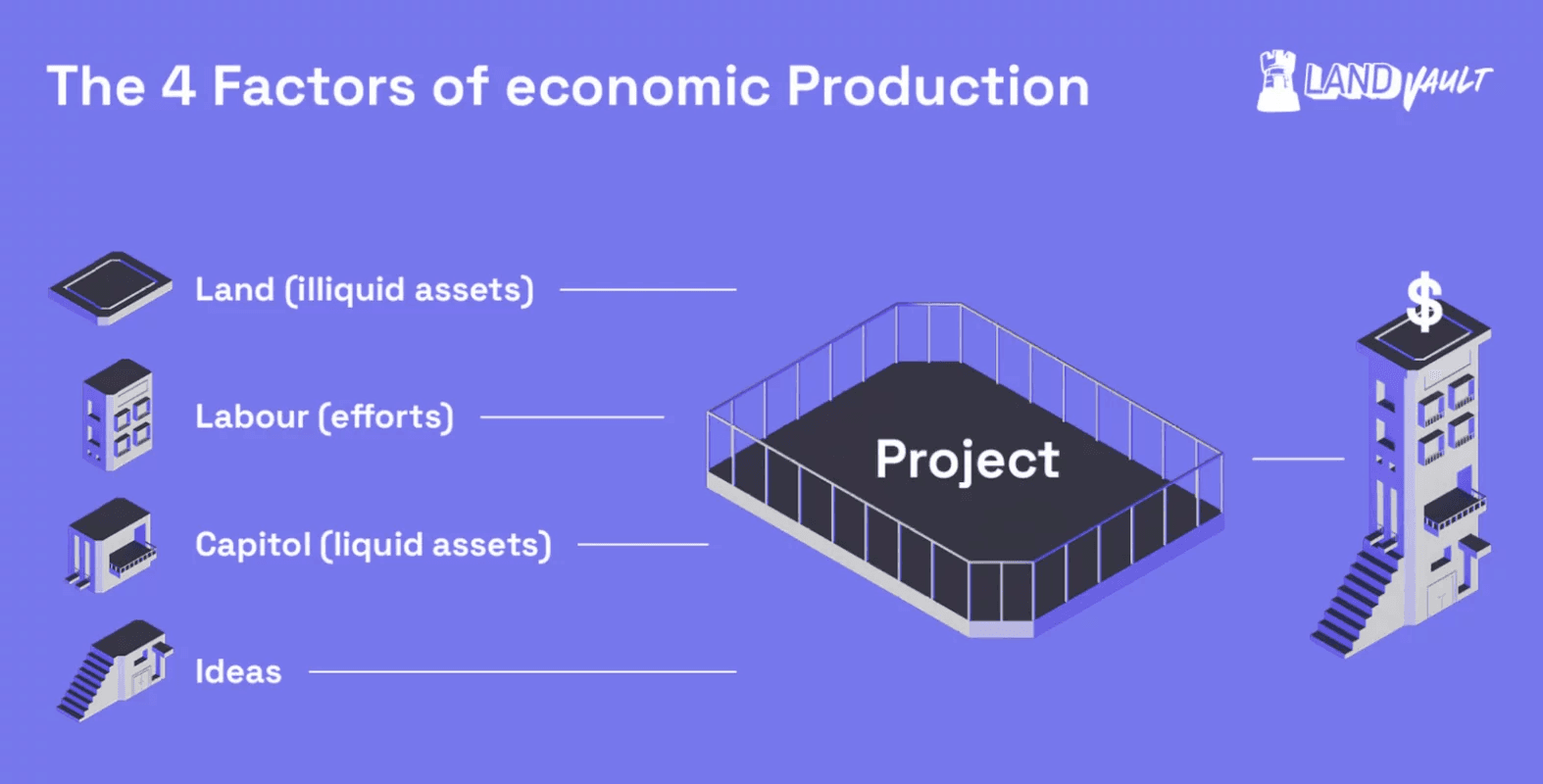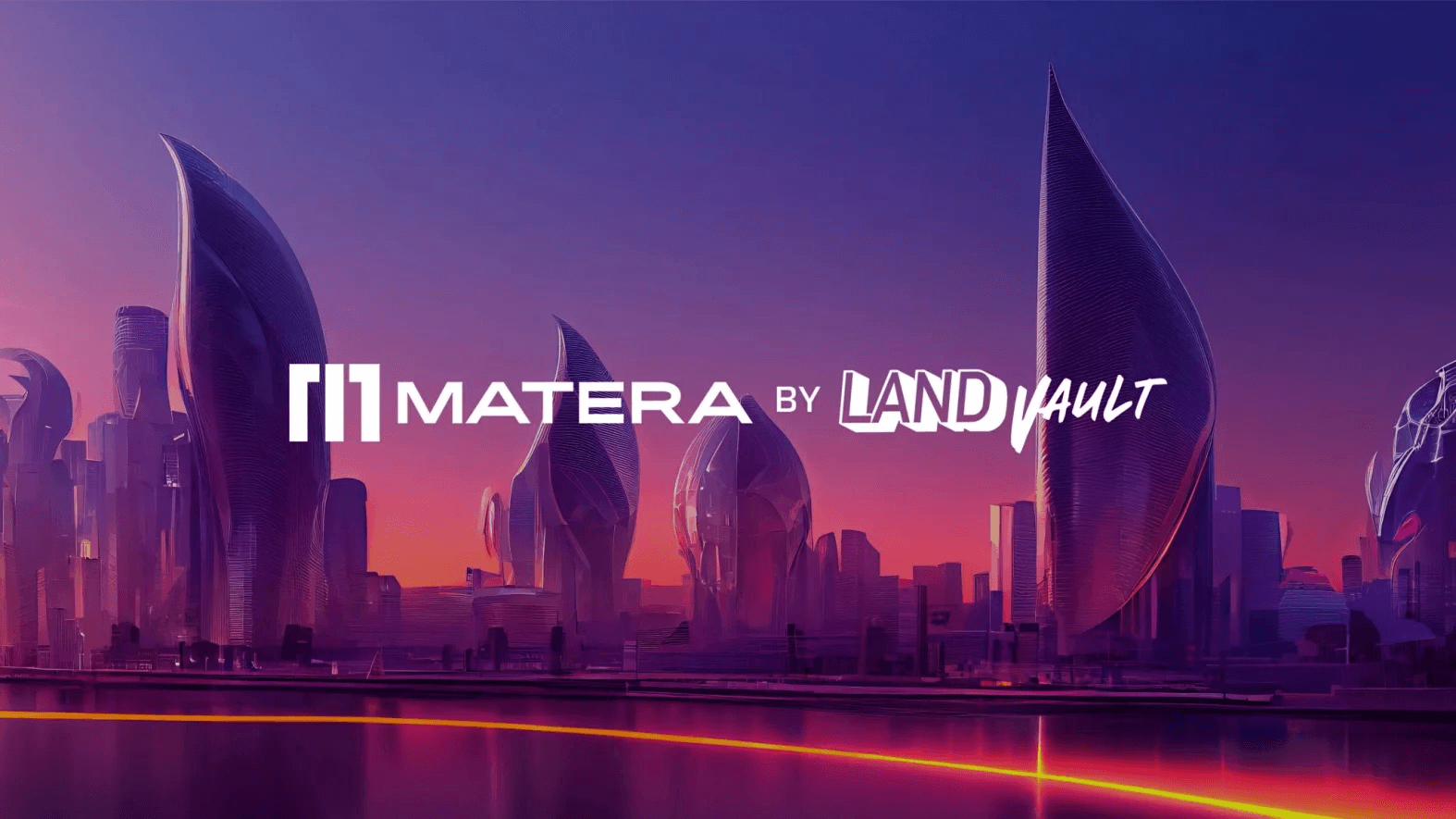Back to Blog
Connecting the dots for a vibrant metaverse economy
Dec 20, 2022
Landvault
Envisioning how the Open Metaverse can grow into a flourishing digital economy can, on the surface, appear difficult in its present state. Metaverse experiences have just begun generating the first bits of revenue from monetization opportunities, brands have taken their first steps into adopting the technology, and users have begun to trickle in, namely for major events and activations.
Currently, economic development only occurs with a manual hand, but its growth is based on the same factors of production that any economy has been established from for hundreds of years. Following economic literature shows us that with an understanding of what economies need to flourish points us toward exactly what the Open Metaverse Economy needs to become a vibrant space of digital trade and commerce.
The Four Economic Factors of Production
Many economic thinkers from the past 300 years have adopted this concept of the factors of production: inputs that are necessary for any economy to develop sustainable activity and growth.
Those four inputs are the following:
Land
Labor
Capital
Ideas (entrepreneurship)
With these four inputs, economic output can occur. The first of these is that of land. Land is what enables development to take place, serving as the base layer of functional trade and commerce. In addition to land is that of labor. Labor simply refers to the skills and time necessary to actually produce value (i.e. goods or services).
Capital is represented by the investors that provide the funds that are needed to either acquire resources with which to produce value, acquire land with which to enable trade and commerce, or to compensate the labor required in the actual production process. So, if land and labor are needed to produce an economic output, the capital is what foots the bill.
The last input of Ideas is a bit more abstract (often referred to as just entrepreneurship in established literature). Ideas are what ultimately kickstart the economic process in the very beginning, setting the groundwork and expectations for how to produce value in the first place. This is also what drives innovation, which leads to more development, growth, and progress for the economy. Although abstract, entrepreneurship is often the most scarce factor - someone that will not just ignite the entire process of production of value, but also take it to fruition, and then to the next level, and beyond.
Combining these four inputs is what creates an output in economic value. The process can be visualized like this: An entrepreneur hatches an idea for a new business model. To create this business model, the entrepreneur then needs to acquire the three other inputs: land, labor, and capital. The land represents where business will be conducted and constructed. For example, this could be a shop where a product of value is expected to be sold. Next, labor is needed to physically produce the products of value and to run the business. To accomplish both of these things, the entrepreneur requires capital to pay for expenses until the business begins to generate its own revenues. Once these inputs are gathered and utilized, the final output is a profitable business model that adds to the value of the overall economy.

Applying the Factors of Production to the Open Metaverse Economy
The very same four factors of production identified above are also how the Open Metaverse Economy already produces value. In this case, the output will be representative of a project or metaverse experience.
The Open Metaverse Economy uses the same concept of land ownership and development to produce value like traditional economies. The land in this case is the virtual land found within the land layer over top metaverse platforms like The Sandbox, Decentraland, and Somnium Space. The main economic production comes from developing this existing land layer into the metaverse experience (i.e. application) layer where stakeholders interact via monetized experiences.
The labor is still the skills and time needed to produce value, only within the Open Metaverse Economy that specifically represents creators that build out projects. Capital is still required to A. acquire virtual land within a metaverse platform and B. to compensate the creators who enable the development of that virtual land.
Lastly, the most important input remains the idea i.e. the entrepreneurship required to come up with and turn an idea into economic value. For the Open Metaverse, this would be the business model and creativity needed to visualize a monetized, revenue generating metaverse experience.
So, each project that has all four inputs produces a revenue-generating metaverse experience and ultimately represents the development of the experience layer of the Open Metaverse Economy.
Accelerating the Development and Growth of the Open Metaverse Economy
With an understanding of the four factors of production, it can now also be understood how the Open Metaverse Economy already produces economic value. The tricky part is appropriately accelerating that development and scaling its growth to encompass millions of experiences (and, consequently, billions of future users).
As of 2022, building metaverse experiences (or in other words, creating economic output via a project) is a manual, expensive, and time-consuming process. According to LandVault’s internal data, one metaverse experience requires an average of:
8 Weeks
14 Designers, Creative Directors, Account Managers
55 Email Exchanges
$15,000 in Admin Expenses (excluding costs of build or land)
To achieve rapid growth, the Open Metaverse Economy must have improved development processes. This is precisely LandVault’s objective operating within the Open Metaverse.
Coordination between the inputs must become easier to enable this to happen. Land owners, creators (laborers), liquidity providers (capital), and entrepreneurs (ideas) need a way with which to efficiently collaborate their own skills and resources to better produce experiences. This is made possible by the LandVault's newest initiative: Matera Protocol.
Matera is an open protocol that streamlines the production and monetization of metaverse experiences at an unprecedented scale. The protocol is designed to enable the coordination of needed activities and resources (i.e. bringing the four factors of production together) required for monetizing the experience layer of the Open Metaverse Economy by bringing the ability to tokenize an experience, mint it into an NFT and consequently drastically increasing the possibilities of ideas and skills to be funded and executed.
By making economic coordination far easier and more efficient, the rate at which metaverse experiences can be produced and monetized will increase exponentially. This will lead to much faster overall development, a greater acceleration of economic activity and value production, and a faster rate of global adoption by users. This is the creation of a significant economic growth flywheel that will help turn the Open Metaverse into a vibrant, thriving digital economy.

Summary
Every single economy includes the same four factors of production to produce economic output (and long term growth). The way in which those four factors of production come together can vary. The Open Metaverse Economy is already producing economic value via these four inputs.
However, streamlining that economic production is the key to developing the land layer into a revenue-generating experience layer. This is what the Matera protocol is being created to accomplish. Via Matera, economic development and growth can be rapidly accelerated, speeding up the process of creating metaverse experiences, monetizing content, and attracting more users.
Dec 20, 2022
Landvault
Subscribe to our monthly newsletter
About Landvault
Landvault is building infrastructure to accelerate the metaverse economy, by building tools to create, deploy and monetize content. The company has helped over 200 clients enter the metaverse, including both Fortune 500 companies and government organizations like the Abu Dhabi government, Mastercard, L’Oreal, Red Bull, and Heineken. The company has raised a total of $40m over the past three years and continues to pioneer technological advancements.
